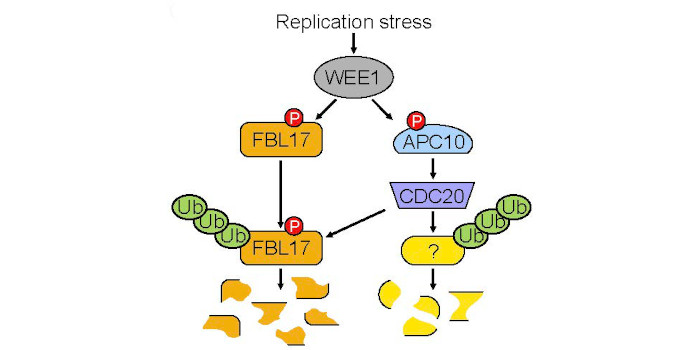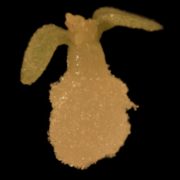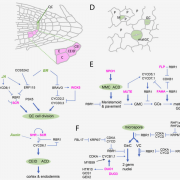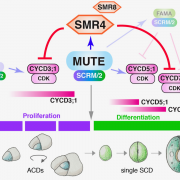A new road to resolve DNA replication stress
Ting Pan, Shan Gao, Xiaoyu Cui, Lili Wang and Shunping Yan
College of Life Science and Technology, Huazhong Agricultural University, Wuhan, Hubei 430070, China
Background: DNA replication is a fundamental process for all organisms. Many exogenous and endogenous factors inhibit DNA replication and affect plant growth and development. When DNA replication has problems, cells try to stop progression of the cell cycle to allow themselves enough time to solve these problems. The protein kinase WEE1 can phosphorylate and promote the polyubiquitination and degradation of F BOX-LIKE17 (FBL17), an E3 ubiquitin ligase required for cell cycle progression. The E3 ubiquitin ligase Anaphase-promoting complex/cyclosome (APC/C) promotes cell cycle progression from metaphase to anaphase by promoting protein degradation.
Question: Which E3 ubiquitin ligase mediates the polyubiquitination of FBL17?

Findings: We found that the polyubiquitination and degradation of FBL17 requires two subunits of APC/C, APC10 and CELL DIVISION CYCLE 20 (CDC20). Mechanistically, WEE1 phosphorylates APC10, which enhances the interaction between FBL17 and CDC20 to promote the polyubiquitination and degradation of FBL17. In addition, the loss of CDC20 or APC10 compromises plant’s ability to deal with DNA replication stress, which is partially rescued when FBL17 is mutated.
Next steps: We are working to reveal other mechanisms for DNA replication stress responses by identifying more substrates of WEE1 and APC/C.
Reference:
Ting Pan, Shan Gao, Xiaoyu Cui, Lili Wang, Shunping Yan (2022). APC/CCDC20 targets SCFFBL17 to activate replication stress responses. https://doi.org/10.1093/plcell/koac360






